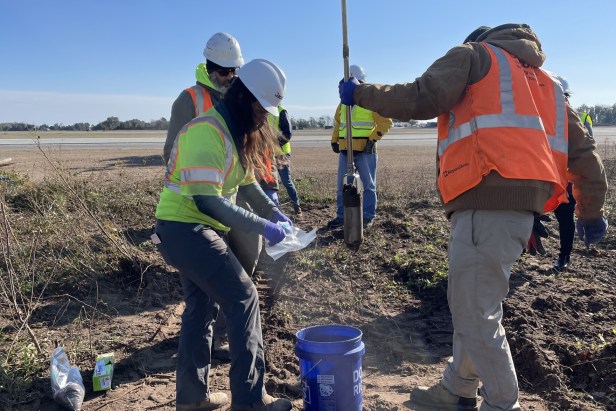The military is looking for PFAS pollution at N.C. bases, but cleaning it up will take decades
By Jay Price | North Carolina Public Radio | February 9, 2022

Read the full article by Jay Price (North Carolina Public Radio)
“The Department of Defense is testing hundreds of military sites around the country, including dozens in North Carolina, for contamination from chemicals known by the acronym PFAS. The chemicals are used in a host of products and often called ‘forever chemicals’ because they don’t fully break down in the environment. Some have been linked with health problems including cancer.
That’s why on a recent day, at a small Marine Corps installation called Bogue Field on the mainland across from Emerald Isle, a team of contract technicians and geologists were clustered around a truck-sized drilling rig as it bored into the soft, sandy soil.
They were drilling wells — 23 of them at carefully-chosen locations dotted around the concrete runways. Soil and water from the wells will be tested for PFAS.
‘And then once we get that data, then we’ll evaluate whether we need to come back and collect additional samples or whether we need to move the investigation on,’ said Kristi Francisco, a remediation project manager with the Naval Facilities Engineering Command Mid-Atlantic in Norfolk, who was overseeing the work.
Military firefighters have used the field for practice, and the flame-suppressing foam they use contains at least one kind of PFAS. Pollution from that type of foam is driving the bulk of the military’s problem with the chemicals.
It has been evaluating PFAS pollution at 700 sites, and Congress just mandated it finish the task by the end of next year.
The Pentagon also must develop a timeline for cleaning the contaminated soil and water. It’s spent hundreds of millions of dollars on PFAS efforts already, and Congress just earmarked another $517 million.
It will eventually need even more, said Richard Kidd, the Deputy Assistant Secretary of Defense for Environment and Energy Resilience.
‘This problem will take years to define and decades to clean up,’ he said.”…
This content provided by the PFAS Project.
Location:
Topics: